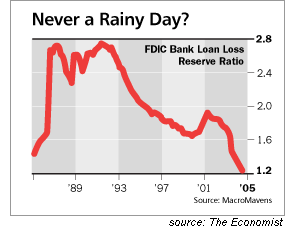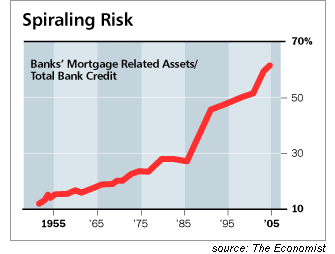| |
Basel II, Risk and Leverage
(July 11, 2006)
 Astute reader Albert T. recently alerted me to financial issues such as the Basel II Accords
which, while being way over my understanding, seem to suggest that leverage--and thus risk--
is rising in the global banking system. I have commented previously on the vast expansion
of risk via derivatives, and the growing dependence of the banking sector on housing. Now
it appears that increased leverage is a global phenomenon, one that is easily buried deep
inside 10-Q statements. Here are some of Albert's comments (my emphasis in bold):
Astute reader Albert T. recently alerted me to financial issues such as the Basel II Accords
which, while being way over my understanding, seem to suggest that leverage--and thus risk--
is rising in the global banking system. I have commented previously on the vast expansion
of risk via derivatives, and the growing dependence of the banking sector on housing. Now
it appears that increased leverage is a global phenomenon, one that is easily buried deep
inside 10-Q statements. Here are some of Albert's comments (my emphasis in bold):
These two things are the most critical in my view IF the government allows amortization of
goodwill there could be some of it that could seep into the capital ratios and make it
possible for banks to be way more leveraged.
Take any major bank and you could see that their leverage has been consistently going up.
"Basel II, which will impose a vastly more comprehensive capital framework on the largest
U.S. depository institutions once it takes effect sometime in 2008, is bearing down on the
country's banking industry like a heavily ladened coal train bound for hell and back."
excerpt from this article
whom will choose Basil II. Also, check
stories on Basel in general.
I get a feeling those whom are itching for
Basel II will be the first large banks to fail in the new century. It basically creates more
disclosure to make it easier to consolidate the industry into extremely large institutions
in my view.
Federal Reserve White Paper and
Federal Reserve, Potential Impact of Basel II.
Page2 paragraph2 is below:
 "The greater risk sensitivity of Basel II is expected to lower the regulatory capital
requirements on the credit risk of most residential first-lien mortgages, although it might
raise them on the most risky mortgages. Those depositories that remain under the current
capital regime, which imposes a four percent regulatory capital charge on all residential
mortgages regardless of risk, are thus expected to face higher regulatory capital
requirements on their residential mortgage portfolios than would Basel II adopters.
The difference in capital treatment has been criticized by some as placing those who do
not adopt Basel II at a competitive disadvantage in the residential mortgage credit
market."
"The greater risk sensitivity of Basel II is expected to lower the regulatory capital
requirements on the credit risk of most residential first-lien mortgages, although it might
raise them on the most risky mortgages. Those depositories that remain under the current
capital regime, which imposes a four percent regulatory capital charge on all residential
mortgages regardless of risk, are thus expected to face higher regulatory capital
requirements on their residential mortgage portfolios than would Basel II adopters.
The difference in capital treatment has been criticized by some as placing those who do
not adopt Basel II at a competitive disadvantage in the residential mortgage credit
market."
Look at the exposure Bank of America
has to mortgages.
If you would like to see something unbelievable go to page 17 also if you look them up notice
the residential and home equity net loss ratios at .002% and .006% respectively. I don't
believe them, this simply looks insane. Even their proceeds from forclosed properties don't
seem realistic to me. I just don't believe those numbers.
At least Washington Mutual's numbers are somewhat realistic although there is an
extreme peculiarity about them. If you notice on page 1 provision for loan and lease losses
is $82 million. Then scroll down and see that they make $985 million in net income. Seems
fine right? Then you go to page 2 and you see Allowance for loan and lease losses at 1.642 billion
and foreclosures of 300 million or so . Then you go to page 50 or 51.
My guess is what they are doing is basically shifting the crap around by moving nonaccruing
loans into securitizations, taking a loss on that instead of lowering their net charge off rate.
Then they sell them to subsidiaries while funding them and the subsidiaries sell them the
loans back with a new 90day clock or another hit on securities to stretch out the losses
and make them seem smaller. But I could be totally wrong, all of this is my opinion anyways.
The thoughts for my last paragraph came from Washington Mutual's 10-q (link above)page 50-53.
Read begining of page 50 and read footnotes especially footnote 2 and right above page 53.
I went back to ababj.com
and read some more and in the end it boils
down to something like this. Right now it is very easy/cheap to start a bank in US. All you
have to do is start a credit union and then mutualize afterwards de-mutualize and go
commercial and/or public. Would take about five or less years because you have to wait
for a year and two years at certain points. In Western Europe it would be much tougher
and/or impossible for someone lacking funds in the millions. This keeps the US banking
system filled with competition which springs up when the market conditions are descent.
In Europe there is usually a banking oligapoly for each country and due to lack of
competition they do not need large equity. In essense they are just making it so that
their equity requirements would be the same be it Europe or elsewhere that is why the
Basel II standard is pushed worldwide.
While we are going through boom and bust cycles of
growth and recessions they are more mellow and aren't really prepared equity wise to meet
this risk even though basel II requirments make it seem like they are. While they would
profit immensely from having same capital requirments world wide ergo their undercapitalized
banks would be able to buy overcapitalized banks because it would be cheap for them capital
wise they would still come out ahead. Expansion wise it would be very appealing. Ergo a
bank with 5% capital to assets buying one with 8% capital to assets is still having its
capital to assets increase as long as they pay lower than 3% in combined capital to assets
for the aquisition ( I think this is extremely simplified but still makes some sense).
Also mature economies have lower discounts on their assets compared to faster growing
counterparts in emerging markets.
Here is an old BusinessWeek article
but you could extrapolate it somewhat. Those two banks are buying stuff in the US
now. The problem arises not in them entering our market but trying to put that capital to
work to earn more money. They will underprice risk and be more leveraged than an average
bank here because they can be after Basel II. Also they will probably make more mistakes
because they will have more money to make those mistakes with.
Two more links:
cepr.org
ey.com
In other words: bank capital requirements, which are already low (see chart above), may
drop even further, setting the stage for bank failures as foreclosure losses exceed
unrealistically tiny loss reserves. Look out for 2008. Very interesting comments and speculation, Albert, on some very difficult and arcane topics.
Thank you for bringing them to our attention.
For more on this subject and a wide array of other topics, please visit
my weblog.
copyright © 2006 Charles Hugh Smith. All rights reserved in all media.
I would be honored if you linked this wEssay to your site, or printed a copy for your own use.
|
|


 Astute reader Albert T. recently alerted me to financial issues such as the Basel II Accords
which, while being way over my understanding, seem to suggest that leverage--and thus risk--
is rising in the global banking system. I have commented previously on the vast expansion
of risk via derivatives, and the growing dependence of the banking sector on housing. Now
it appears that increased leverage is a global phenomenon, one that is easily buried deep
inside 10-Q statements. Here are some of Albert's comments (my emphasis in bold):
Astute reader Albert T. recently alerted me to financial issues such as the Basel II Accords
which, while being way over my understanding, seem to suggest that leverage--and thus risk--
is rising in the global banking system. I have commented previously on the vast expansion
of risk via derivatives, and the growing dependence of the banking sector on housing. Now
it appears that increased leverage is a global phenomenon, one that is easily buried deep
inside 10-Q statements. Here are some of Albert's comments (my emphasis in bold):